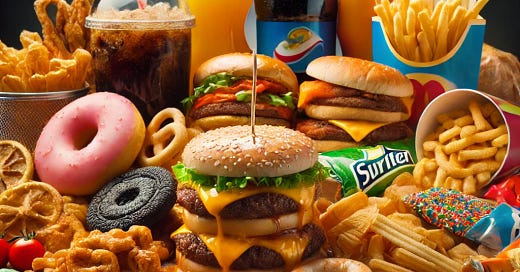Processed Foods
TLDR - Evolutionarily, our ancestors never encountered processed ingredients, making it more difficult for our bodies to digest them today. Most artificial foods are also extremely low in nutrients and inflammatory. This triggers a danger response in the body.
Evolutionary Perspective
Our ancestors thrived on whole foods (fresh fruits, vegetables, nuts, meats, and fish). These foods are nutrient dense, providing the vitamins, minerals, and macronutrients needed for optimal health. The human body evolved over millions of years to digest and utilize these natural foods efficiently.
Processed Foods and the Evolutionary Mismatch:
Unfamiliar Compounds: The introduction of artificial additives, preservatives, and synthetic ingredients is a relatively recent phenomenon in human history. Our bodies have not had enough time to adapt to these new compounds. This evolutionary mismatch means our digestive systems and metabolic pathways are often ill equipped to handle processed foods, leading to various health issues.
Low Nutrient Density: Many processed foods are calorie dense but nutrient poor. They often lack essential vitamins and minerals that are abundant in whole foods. Additionally, the “vitamins” added to processed foods are often in non bioavailable forms that our bodies cannot easily digest and absorb. This means we aren't really getting the nutrition these foods claim to provide. This lack of nutrients can lead to deficiencies, even in individuals who consume sufficient calories.
Inflammatory Ingredients: Artificial ingredients and additives can trigger inflammation. High fructose corn syrup, trans fats, and artificial sweeteners are common culprits found in processed foods.
Refined Sugars: High amounts of refined sugars, especially fructose, can lead to insulin resistance, obesity, and fatty liver disease. These conditions are associated with chronic inflammation.
Trans Fats: These unhealthy fats, found in many processed snacks, baked goods, and margarine, can increase inflammation, negatively affecting heart health and increasing the risk of chronic diseases.
Artificial Additives: Preservatives, colorings, and flavorings can cause adverse reactions in some individuals, leading to inflammation and other health issues.
Refined Carbohydrates: Processed foods high in refined carbohydrates, like white bread and pastries, can cause spikes in blood sugar levels, promoting inflammatory responses in the body.
Additional Concerns
Gut Health: Whole foods provide the building blocks for a healthy microbiome. In contrast, a diet high in processed foods lacks these essential nutrients and can lead to dysbiosis.
Satiety and Overeating: Processed foods are often artificially engineered to taste extremely good. These artificially ingredients can interfere with your body's natural satiety signals, leading to overeating and subsequent weight gain. These foods are also void in nutrients. If your body isn’t getting the nutrients it needs then it will signal to your body that you should continue eating.
What Should I Eat Instead?
Reflecting Thoughts
Do you ever eat processed foods but still feel hungry afterward? This happens because 1. You're not getting the nutrients your body needs, which is why you feel hungry in the first place. 2. Processed foods are inflammatory. When your digestive system is inflamed, it can’t efficiently absorb nutrients, even from the "good" foods you eat. This leaves you feeling hungry until your body finally gets the nutrients it needs.



